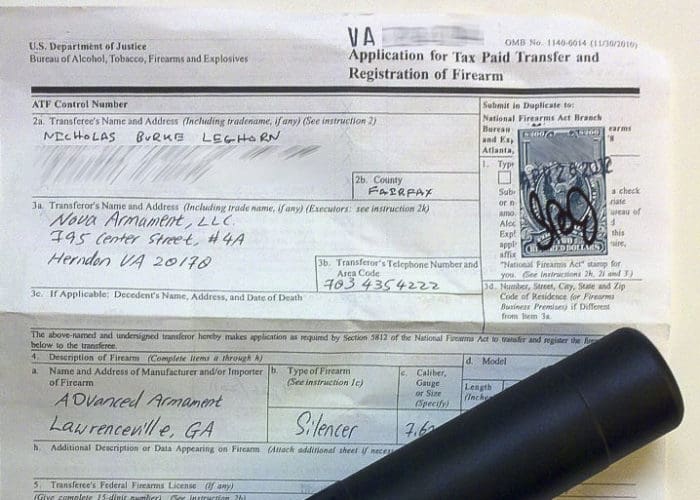By Matthew J. Bergstrom, Esq.
We run into a lot of confusion about the handling of another person’s NFA firearm or accessory and when criminal liability could possibly arise. Generally speaking, possession of an NFA firearm or regulated item by someone other than the registered owner could be viewed as an illegal transfer.
Possession, however, is not limited to the non-registered person being caught red-handed with your suppressor. The concept of constructive possession covers a broader set of circumstances encompassing many common situations for gun owners. Unfortunately, not everyone takes these issues seriously.
Constructive possession exists when a person knowingly has the potential for access or control of NFA firearms outside the supervision of the registered owner of those items.¹ When NFA-regulated items are in possession of someone other than the registered owner it could constitute an unlawful transfer subject to the severe penalties of the NFA and the tax code.
These penalties can include a prison sentence, hundreds of thousands of dollars in fines, and loss of the right to own or possess firearms.²
Some people say legal concerns like these are either over-hyped or mischaracterized by incompetent lawyers peddling poorly designed gun trusts. Other people look to the past and comfort themselves by citing the dearth of criminal convictions resting on constructive possession of NFA firearms. There are also people who believe they have no worries because they never let their guns out of their sight.
We need to be more realistic because times have changed.
Previously, fewer people owned silencers and short-barreled rifles, but in the last decade or so, we’ve seen explosive growth in the number of these items. Consequently the higher profile of NFA-regulated items has placed them under greater scrutiny.
They’ve been threatened by proposed executive orders and more local shooting ranges are likely to ask for your tax stamps. These developments have occurred at a time when all gun owners need to be more concerned about overly aggressive policing of gun laws in many jurisdictions.
Clearly, constructive possession of NFA firearms is an important issue, but with knowledge and proactive solutions, no one should be discouraged from plans to obtain a .22 can or even a machine gun.
Initially, the possibility of another person having access or control of your firearms outside your presence might seem unrealistic…but think again. We’re not talking about black-and-white situations.
Of course you can’t treat your NFA collection like a lending library. But we’re also not talking about the typical visit to the range when your buddy tries out your silencer under your supervision. Those are relatively clear situations. We need to worry about the gray areas of everyday life.
Consider these examples:
- Your daughter drives away with your range bag in the trunk.
- Your wife has the combination to your gun safe.
- Your brother borrows your suppressor.
- You share a hunting camp with friend.
- Your father safeguards your NFA firearms while you are . . .
- Hospitalized
- Vacationing
- Deployed out of country
- Temporarily assigned to work out of state
- Repairing your home from storm damage, or
- Moving into a new home
Could you find yourself in any of the above situations?
Next, let’s add some context. Imagine one of those scenarios happens at the wrong place and at the wrong time. A skillful law enforcement officer could unexpectedly discover a way to throw the book at you with the simplest line of questioning.
“You match the description of someone we’re looking for and your taillight is out. Is this your car? Who owns it? Is he a gun owner? Are there guns in the car? Can you show us? Do you have paperwork for this silencer?”
Or…“Ma’am, we received a call from your home security company, do you want us to check your house? Are there guns in the house? Do you have access to them? Whose SBR is this?”
If you understand these risks, you’ll know how to secure your NFA firearms. If you wish to mitigate the legal risk for yourself and others who might have constructive possession of your firearms, then you should consider forming a legal entity like a trust.
Eligible people named in a trust may have legal possession of the property in the trust. Thus, no transfer legally occurs when people in your trust have potential access or control of the NFA-regulated items in your trust.
A trust has added benefits. It can serve as an estate plan for your firearms and is the only legal method of conveying property at your death that will avoid a public court record. Trusts are also eligible for ATF eFile, which, despite the occasional glitch, processes tax stamps more quickly.
Please note: We offered this analysis for informational and discussion purposes only, and it isn’t intended as legal advice. If you have questions or concerns about firearms law, please contact a good attorney.
¹ See U.S. v Booth, 111 F.3d 2 (1st Cir.1997); United States v. Cardenas, 864 F.2d 1528, 1533 (10th Cir.), cert. denied, 491 U.S. 909, 109 S.Ct. 3197, 105 L.Ed.2d 705(1989); United States v. Hien Van Tieu, 279 F.3d 917, 922 (10th Cir. 2002).
² 26 U.S.C. § 5871.
Matthew J. Bergstrom, Esq. is managing attorney of Arsenal Attorneys, which offers the Arsenal Gun Trust and a variety of other legal services for gun owners and the firearms industry across the United States. One hundred percent of Arsenal Attorneys’ clients are gun owners.
